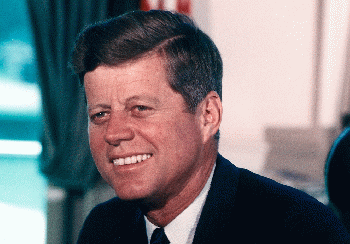Sixty years after the assassination of John F. Kennedy seems like an appropriate time to not only look back at his life but also his untimely death, both historically and from the perspective of my experience.
Born just months before Pearl Harbor, I spent my childhood years during the New Deal era of FDR, while World War II was going on. I spent many of my formative years during the Eisenhower administration, years of Cold War America, of the McCarthy era, the House Un-American Activities Committee and the disillusionment of the U2/Francis Gary Powers, spying incident. It was a time of being careful and conforming to a conservative society and corporate ascendency. It was also a time of the rise of the Dulles brothers, one Secretary of State and one the head of the CIA. The CIA, formed under Truman (he later said that was one of his biggest mistakes), that had increased its power and reach during that period, although most of us were not very aware of this.
I was a young adult at the University of Minnesota when John Kennedy was elected in 1960. I was not quite old enough to vote for him, but I was aware of American politics, and had watched the Kennedy/Nixon debates on TV.
The Kennedy years were a breath of fresh air. New energy, change and new possibilities were in that air. The Cold War was still significant, but the Cuban Missile Crisis hinted at possible change. But there was also the new ways of looking at the world and ways to be active through positive change such as the inspiring Peace Corps.
In September of 1963, at 22, my wife, a recent graduate of the University of Minnesota, and I were married. She was teaching in the Minneapolis School System, and I was plodding along toward graduation after many changes of major. On November 22nd, almost exactly two months after our wedding, I was in a Shakespeare class on campus when the word came about the assassination of the president. Class was dismissed and as I walked down the steps of the building, I heard another student say quite clearly, "I'm glad". I was shocked but kept on walking, nearly in a trance, trying to deal with the sudden death of such a vital president.
Over the next hours and days, it was like time stood still as we, like most of America, watched events unfold on TV. We felt like the world had changed in some significant way. We were right. And living through that time gave an experiential perspective and context to whatever has come since.
Nearly everyone understood, on some very visceral level, that those bullets had made a very fundamental change in, not only this nation, but also in the direction of the world. Those bullets changed the course of this nation from a more humane and democratic trajectory back to a more closed, secretive and manipulative Cold War trajectory.
Shortly before his assassination, Kennedy's American University Commencement Speech gave a frame of reference about the hoped-for direction he saw for this nation and the world. He said, "And if we cannot end now our differences, at least we can help make the world safe for diversity. For, in the final analysis, our most basic common link is that we all inhabit this small planet. We all breathe the same air. We all cherish our children's future. And we are all mortal."
Here are some of the things that would change with his assassination.
He had begun a process of withdrawing troops from Viet Nam, but, after his assassination, the war in Viet Nam would continue and widen.
He had begun to find connections to Russia through Khrushchev and the beginning of communications with Castro in Cuba in hopes of ending the Cold War but, after his assassination, those communications stopped, and the Cold War continued its inexorable path.
He had begun to change the CIA to get it under control again but, after his assassination, the CIA continued on its Cold War path, with a vengeance.
He had been confronting the nuclear threat in some meaningful ways, but after his assassination those hopes were diminished.
A new creative spirit was developing in the nation, full of hope and possibility but, after his assassination that spirit began to be opposed and often thwarted.
The nation moved back to a more "business as usual" stance; with growing support for corporations and personal wealth, back to the Cold War mentalities, including more militarization, and more of a confrontational and competitive position domestically and on the world stage.
(Note: You can view every article as one long page if you sign up as an Advocate Member, or higher).






